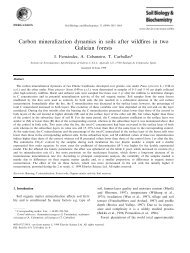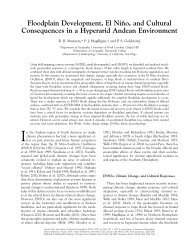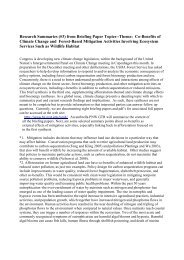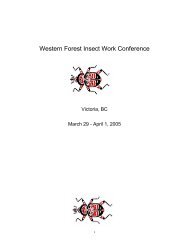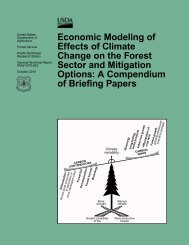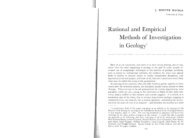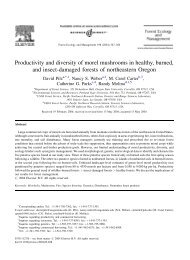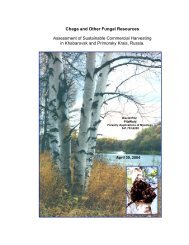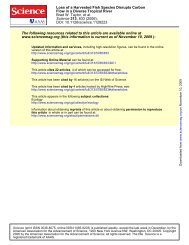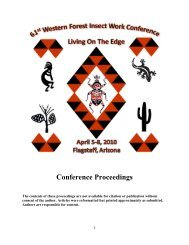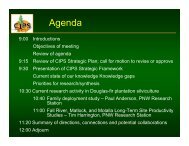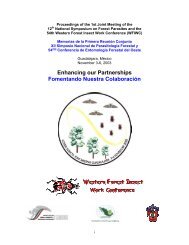IntensIve sIlvIculture - Forest Science Labs - Research Network ...
IntensIve sIlvIculture - Forest Science Labs - Research Network ...
IntensIve sIlvIculture - Forest Science Labs - Research Network ...
Create successful ePaper yourself
Turn your PDF publications into a flip-book with our unique Google optimized e-Paper software.
235<br />
Abstract: Two studies on the effects of insects on Douglas fir [Pseudotsuga menziesii] seed<br />
and seedling production in Oregon are summarized. In the first study, seed losses due to Douglas<br />
fir cone gall midge [Cecidomyiidae] and Douglas fir seed chalcid [Megastigmus spermotrophus]<br />
were studied. It is suggested that resistance to these pests may be a heritable trait and that tree<br />
position within a stand can modify genetically-controlled susceptibility to insect attack. The<br />
second study indicated that genetically-controlled susceptibility of seedlings to attack by lygus<br />
bug [Lygus sp.] could be modified by their proximity to alternative food plants.<br />
537. Schowalter, T.D. and M.I. Harverty. 1989. Influence of host genotype on Douglas-fir seed losses<br />
to Contarinia oregonensis (Diptera: Cecidomyiidae) and Megastigmus spermotrophus<br />
(Hymenoptera: Torymidae) in Western Oregon. Environmental-Entomology 18(1): 94-97.<br />
Keywords: genetic tree improvement<br />
seed orchard management<br />
tree/stand protection<br />
genetic relationships<br />
tree/stand health<br />
Abstract: Seed losses due to the cecidomyiid Contarinia oregonensis and the chalcid<br />
Megastigmus spermotrophus were measured in a Douglas-fir (Pseudotsuga menziesii) clonal seed<br />
orchard and in a Douglas-fir progeny plantation in western Oregon. Seed losses due to both<br />
insects differed significantly among clones and among the progeny of selected parental crosses.<br />
Seed loss differed more than 3 times between least-infested and most-infested clones or progeny.<br />
Seed losses in the progeny plantation indicated that resistance to these 2 insects is a heritable trait,<br />
with greater resistance showing a tendency to dominate over lesser resistance. Insect responses to<br />
host genotype may be modified by factors associated with the position of the tree within the<br />
stand. Implications of these results for tree improvement programmes and seed orchard<br />
management are discussed.<br />
538. Schowalter, T.D., M.I. Haverty, S.A. Dombrosky and J. Sexton. 1986. Response of Douglas-fir<br />
cone gall midge and Douglas-fir seed chalcid to host plant genotype. In Proceedings of the 2nd<br />
Conference of the Cone and Seed Insects Working Party, Station de Zoologie <strong>Forest</strong>iere, Olivet,<br />
France, September 3-5, 1986. Ed. A. Roques. pp. 217-223.<br />
Keywords: genetic tree improvement<br />
seed orchard management<br />
tree/stand protection<br />
genetic relationships<br />
tree/stand health<br />
Abstract: Seed losses due to 2 species of insects were measured from cones of 51 parental<br />
crosses (or families, distinct combinations of 6X11 parents) in a 12-year-old progeny plantation<br />
of Douglas fir (Pseudotsuga menziesii) in western Oregon. In 1983 and 1984, seed losses due to<br />
Contarinia oregonensis were significantly different among host families. During 1984, 4 of 5<br />
families with the highest midge damage (x=79%) shared a common parent and 4 of 5 families<br />
with the lowest midge damage (43%) shared a common parent. This indicates that resistance or<br />
susceptibility to the cecidomyiid is probably heritable. Losses due to Megastigmus spermotrophus<br />
were measured only in 1984 and were also significantly different among host families. Insect<br />
responses to host genotype appeared to be influenced by the position of the tree within the<br />
plantation, by the size of the cone crop and, in the case of M. spermotrophus, by prior activity of<br />
C. oregonensis.



